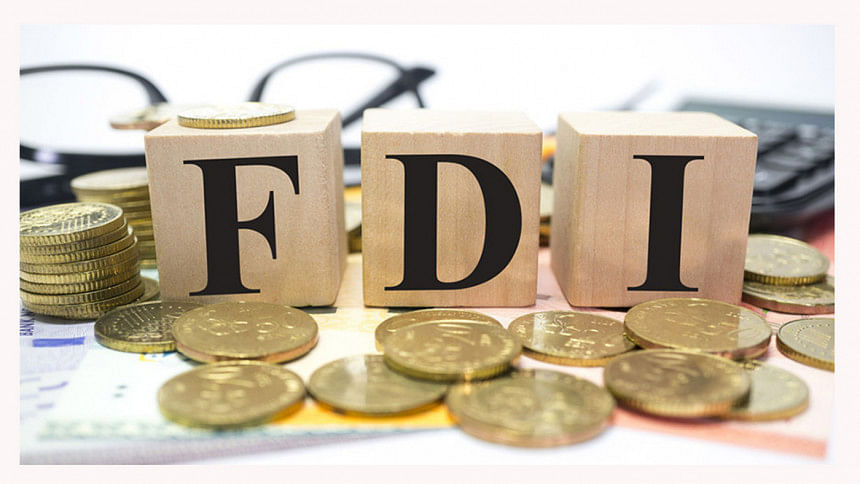Reinvestment of earnings pushed FDI up in 2022

Foreign direct investment (FDI) in the country increased 20 per cent year-on-year to $3.48 billion in 2022 for a surge in reinvestment of earnings by foreign companies.
Analysts say the increase in FDI would not have any significant impact on the economy since there was a remarkable decline in the inflow of equity capital and intra-company loans, two major components of the inflow.
Net FDI inflows are the value of equity capital of non-resident investors, including reinvested earnings and intra-company loans. This excludes the amount that goes out of a country through the repatriation of capital and repayment of loans.
Reinvested earnings stood at $2.51 billion last year, up 61 per cent year-on-year, showed data from Bangladesh Bank. Foreign investors usually invest such types of funds from their earnings generated by companies located in Bangladesh.
Equity capital, which is brought from abroad to set up new industries or expand the existing ones, declined to $1.02 billion in 2022, down 10.2 per cent from that the year before.
There is also a negative development in the field of intra-company loans, the funds of which are borrowed by foreign firms from parent entities, as it registered an outflow of $57 million in contrast to an inflow of $194 million in 2021.
Ahsan H Mansur, the executive director of the Policy Research Institute of Bangladesh, said there was no scope to be satisfied as equity capital and intra-company loans had dropped.
The central bank data indicated that the foreign companies had hardly brought any fresh funds from abroad, which is why the increase in FDI will not create any meaningful impact on the country's foreign exchange reserves, he said.
He reckons that the country's banking sector has been facing a shortage of foreign exchange in the last 12 to 14 months, creating difficulties for foreign entities to repatriate their profit abroad.
So reinvested earnings of the foreign companies were on the increase, he said.
The ongoing instability in the macroeconomic zone has discouraged foreign investors from bringing their funds into the country, said Mansur, also a former official of International Monetary Fund.
Mamun Rashid, an investment analyst, echoed almost the same.
Stress in the foreign exchange market has created difficulties in repatriating the earnings of foreign companies, playing a role in the surge of reinvested earnings, he said.
Some foreign banks and multinational companies reinvested earnings in the arena of the FDI, he said.
Mustafizur Rahman, a distinguished fellow at the Centre for Policy Dialogue, said the increase in FDI would not give any relief to the ongoing stress in the foreign exchange market as foreign investors hardly brought any funds from abroad.
But for the reinvested earnings to have surged is a positive development for the economy, he said.
The country's FDI did not register any meaningful growth even when the scenario was normal for businesses due to a number of barriers in the country's financial sector, Rahman said.
"We should address our age-old problems in the business sector. Ease of doing business, dispute settlement mechanism and efficiency of the government agencies concerned should be improved," he said.
TIM Nurul Kabir, executive director of the Foreign Investors' Chamber of Commerce & Industry, said the global economy now was not in a good shape, which has also created a negative impact on the FDI flow.
"Our potential is enormous, but we have not managed to attract our desired FDI yet," he said.
Foreign investors feel there is a lack of predictability in Bangladesh when considering making investments, he said.
Rules and regulations are changed in the country frequently, which leads to unpredictable situations for foreign companies, he said.
Under such a situation, doubts arise in their minds over making investments in Bangladesh, Kabir said.
Bangladesh Investment Development Authority has recently taken a number of initiatives, which are quite positive, he said, adding that other government agencies concerned should take up similar measures.

 For all latest news, follow The Daily Star's Google News channel.
For all latest news, follow The Daily Star's Google News channel. 



Comments